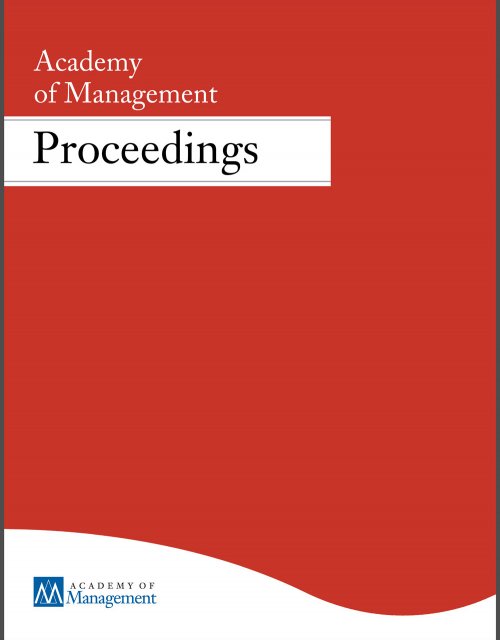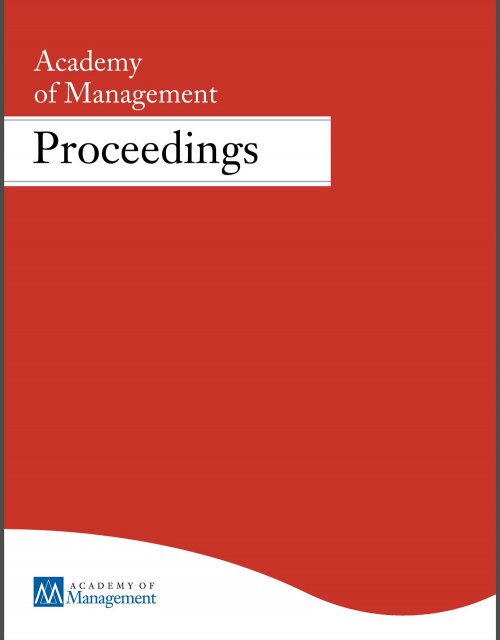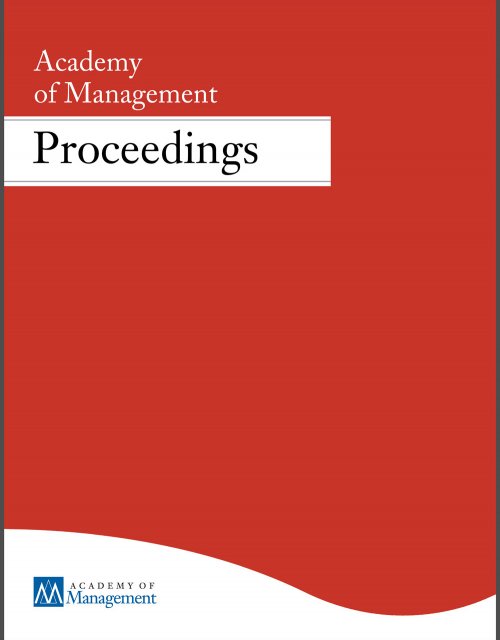Publication records
Subject(s)
Technology, R&D management
Keyword(s)
digital identity, digitization, public administration, European Union
The book chapter "Digital Identity" in the Handbook "Digitization of the State and Public Administration" analyzes digital identification and authentification technologies and their impact in public administration and society. First, it introduces and defines the concept of digital identity. Second, it gives an overview of the technologies' applications in public administration and beyond. Third, it analyzes their governance and implementation in Europe and Germany. Fourth, it presents perspectives for the future development of digital identity in increasingly networked societies.
Secondary Title
Handbuch Digitalisierung in Staat und Verwaltung
Edition
2nd ed.,
ISBN
978-3-658-23669-4
ISBN (Online)
978-3-658-23669-4
Subject(s)
Human resources management/organizational behavior
Keyword(s)
error, error management, failure, psychological safety, organizational learning
Even if we strive for an organizational learning culture that does not punish mistakes and failure, implementation is difficult. Especially when damage has been done, people are quick to talk about "culprits" and "sanctions," but this benefits no one. Analysis of the failure usually reveals that several factors played a role. Talking openly about this requires that the employees feel psychologically safe.
In aviation, openly dealing with mistakes is not only tolerated, but actively demanded. There, it is not the error that is the problem, but the unrecognized – or worse – the unreported error. This leads to the seemingly paradoxical result that, in the area of a high-risk organization of all places, the open, non-punitive handling of errors is the norm. The focus is on learning from mistakes in order to be able to avoid them henceforth. This principle should also apply to companies that want to reduce the errors that occur in their projects and processes.
In aviation, openly dealing with mistakes is not only tolerated, but actively demanded. There, it is not the error that is the problem, but the unrecognized – or worse – the unreported error. This leads to the seemingly paradoxical result that, in the area of a high-risk organization of all places, the open, non-punitive handling of errors is the norm. The focus is on learning from mistakes in order to be able to avoid them henceforth. This principle should also apply to companies that want to reduce the errors that occur in their projects and processes.
Journal Pages
218–222
Subject(s)
Human resources management/organizational behavior; Strategy and general management
Keyword(s)
office design, gender, networks, field experiment
Within organizations, women remain to this day underrepresented in leadership roles. One key explanation for this focuses on differences in the way men and women socialize at the office and build professional network. Women’s networks are less likely to afford them early access to important and diverse information that would benefit their careers. In this paper, I investigate office spatial design as a managerial lever to shape employee networks, and its differential impact on male and female employees. Further, I study gender differences in the relationship between proximity in an office space, network tie formation, and network brokerage. Seating assignments that closely match the organization’s functional groupings add spatial segregation to the pre-existing occupational segregation between men and women. I argue that breaking functional silos in seating assignments can allow women, to a larger extent than men, to diversify their ties and to access more advantageous network positions. I use data from a quasi-field experiment where the seating plan of a Mexican company’s headquarters was manipulated with the aim to decrease work-interdependence between office neighbors. Following the office reconfiguration, I find that female employees are more likely than male employees to form friendship ties with their new desk neighbors and that women’s friendship networks are more likely to become more brokerage-rich. I also find evidence that women whose networks see an increase of brokerage following the reconfiguration tend to see their wage increase.
With permission of the Academy of Management
Volume
2022
ISSN (Online)
2151-6561
ISSN (Print)
0065-0668
Subject(s)
Human resources management/organizational behavior
Keyword(s)
career regret, career decisions
JEL Code(s)
M12
Although the topic of career regrets is of interest both to research and practice, the scholarly development of this field is still rather nascent. In particular, the knowledge about the occurrence and development of career regrets remains to be limited. Drawing on the qualitative data collected through individual reflections (N=50) and semi-structured interviews (N = 22), we explore the nature of an individual’s career regrets and how a career decision becomes a regret. Our findings suggest a broader understanding of career regrets that spreads beyond regrets that are tied to occupational choices. In line with this broad understanding of career regrets, we develop a framework of a career decision becoming a career regret. Our findings also show that when people reflect on career decisions in terms of how they should have behaved differently, there are some that they perceive as career regrets while others take a form of career mistakes or career realizations. We distinguish these different ways of viewing career decisions, suggesting that the latter two kinds of decisions are more influential in shaping an individual’s future career decisions than career decisions that are career regrets. Our research has important theoretical and practical implications concerning career regrets.
With permission of the Academy of Management
Volume
2022
ISSN (Online)
2151-6561
ISSN (Print)
0065-0668
Subject(s)
Economics, politics and business environment
Keyword(s)
big Five personality traits, Locus of Control, Risk attitudes, age-period-cohort decomposition, life cycle
JEL Code(s)
D8, J1
Volume
123
Journal Pages
2141–2172
Subject(s)
Management sciences, decision sciences and quantitative methods
Keyword(s)
research reliability, generalizability, archival data, reproducibility, context sensitivity
Volume
119
Journal Pages
2120377119
Subject(s)
Human resources management/organizational behavior
Keyword(s)
Cross-unit collaboration, lateral change, leading change from the middle, stakeholder management, power and politics in organizations, emotional intelligence, leading change as part of a digital transformation process, diversity
Lucia Fargolo is a dynamic high potential who joined FoodCo – a global fast moving consumer goods (FMCG) company at the beginning of their digital transformation journey. After a promotion to department head, Lucia is preparing the global Social Media Marketing strategy. The implementation should start be piloted with a few brands. While Lucia is planning for the launch of the pilot with the brand category managers, there is however a hiccup: one seasoned brand manager seems to be totally off-board with Lucia’s plan. He doesn’t even show up for the strategy workshop she organized. What should Lucia do now?
The company, all names, characters, and incidents portrayed in this case are fictitious. No identification with actual persons, places, companies, and products is intended or should be inferred.
| buy now | buy now | buy now |
Subject(s)
Diversity and inclusion; Entrepreneurship; Human resources management/organizational behavior; Management sciences, decision sciences and quantitative methods; Strategy and general management
Keyword(s)
underdog, luck, opportunities
ISSN (Print)
0017-8012
Subject(s)
Economics, politics and business environment; Technology, R&D management
Keyword(s)
Pharmaceutical industry, innovation, patents, Markush structures
Markush structures are molecular skeletons containing not only specific atoms but also placeholders to represent broad sets of chemical (sub)structures. As genus claims, they allow a vast number of compounds to be claimed in a patent application without having to specify every single chemical entity. While Markush structures raise important questions regarding the functioning of the patent system, innovation researchers have been surprisingly silent on the topic. This paper summarizes the ongoing policy debate about Markush structures and provides first empirical insights into how Markush structures are used in patent documents in the pharmaceutical industry and how they affect important outcomes in the patent prosecution process. While not causing frictions in the patent prosecution process, patent documents con-taining Markush structures have an increased likelihood to restrict the patentability of follow-on inventions and to facilitate the construction of broad patent fences.
View all ESMT Working Papers in the ESMT Working Paper Series here. ESMT Working Papers are also available via SSRN, RePEc, EconStor, and the German National Library (DNB).
Pages
47
ISSN (Print)
1866–3494
Subject(s)
Human resources management/organizational behavior
Keyword(s)
sex, network perception, recall accuracy
We seek to understand how individuals from different groups conceive, build and gain benefit from their social networks in order to be able to generate better predictions and interventions that could help more disadvantaged individuals to nurture more productive networks and extract greater gains from such networks. The projects included in the symposium tackle the idea of different network use and returns distinguishing categories of individuals along the lines of race, individual traits, and gender. The projects give insights on how actors that belong to specific social and demographic categories can use and leverage their networks to achieve positive outcomes and overcome their disadvantageous positions. Structural barriers, cognitive impediments, or beliefs about the other make minority groups unable to benefit from the networks in the same ways as the majority group. Yet, our symposium seeks to understand and propose different ways to solve the issue and create a better world in which all individuals have an equal opportunity to thrive, regardless of their group membership. With this symposium, we argue that there is a need to consider the different paths and conditions that impact individuals’ intentions to create, maintain, and utilize their network ties more closely, in order to deepen our understanding of individuals networking patterns and be able to implement effective interventions.
With permission of the Academy of Management
Volume
2022
ISSN (Online)
2151-6561
ISSN (Print)
0065-0668


